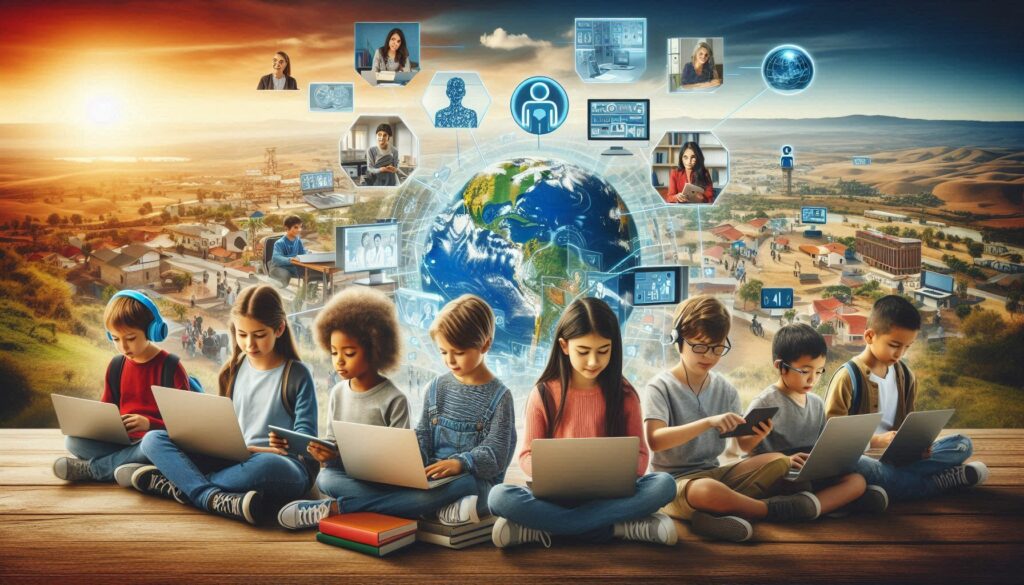
AI CERTS
7 months ago
The Future of Artificial Intelligence in Education
Artificial Intelligence (AI) is reshaping numerous sectors, including healthcare, finance, and transportation, but one of the most profound impacts is seen in education. As AI technology evolves, it is set to redefine how students learn, how educators teach, and how educational institutions operate. This transformation is not just about automation; it’s about enhancing the learning experience, making education more accessible, and preparing students for a rapidly changing world.

In this article, we will explore how AI is revolutionizing education, focusing on personalized learning, intelligent tutoring systems, innovative assessment methods, and increasing access to education globally. We will also address the ethical considerations and challenges of this technological shift.
The Rise of Personalized Learning: Tailoring Education to Individual Needs
At the forefront of AI’s influence in education is personalized learning. Traditionally, educational settings have operated on a one-size-fits-all model, where the same teaching methods and materials are applied to all students. This approach often overlooks the unique learning styles, interests, and abilities of individual learners. However, AI-powered platforms are changing this narrative by offering tailored educational experiences that adapt to the needs of each student.
AI algorithms analyze a student’s learning patterns, strengths, and weaknesses, allowing for a customized approach to education. For example, an AI platform can identify that a student excels in language arts but struggles with mathematics. Consequently, it can provide more resources and support in math while allowing the student to progress more quickly in language arts.
These personalized learning experiences offer significant benefits:
Benefits of Personalized Learning:
- Individualized learning pathways: AI systems create tailored lesson plans that adjust based on real-time performance data.
- Targeted support: Students receive focused assistance in areas where they face challenges, promoting a deeper understanding of complex concepts.
- Flexible pacing: Learners can progress at their speed, reducing feelings of frustration or boredom, and leading to enhanced engagement and retention.
Additionally, AI provides educators with valuable insights into student performance. By offering detailed analytics, AI tools help teachers identify gaps in understanding and adjust their teaching strategies accordingly. This dynamic approach fosters a more responsive educational environment, ensuring that all students have the opportunity to thrive.
Intelligent Tutoring Systems: Your Virtual Tutor
Another remarkable advancement in AI is the development of Intelligent Tutoring Systems (ITS). These systems act as virtual tutors, providing real-time support and guidance to students as they navigate their learning journeys. By assessing a student's current understanding, ITS can offer personalized feedback, recommend additional resources, and help clarify difficult concepts.
One of the primary advantages of ITS is its availability. Unlike traditional tutoring services, which may be limited by time and resources, virtual tutors are accessible 24/7. This means students can seek help whenever they need it, whether late at night or during a lunch break at school.
Advantages of Intelligent Tutoring Systems:
- On-demand assistance: Students can receive help whenever they need it, encouraging independent and self-paced learning.
- Immediate feedback: ITS provides real-time responses to questions, helping students overcome obstacles quickly.
- Scalability: With ITS, one-on-one support can be scaled to accommodate a larger number of students, enhancing the learning experience.
ITS is particularly effective in subjects such as mathematics and science, where problem-solving skills are crucial. These systems can break down complex problems into manageable steps, guiding students through the learning process and helping them gain confidence in their abilities. As AI technology continues to advance, we can expect these systems to become even more sophisticated, offering deeper insights and more tailored support.
For more insights into the global impact of intelligent tutoring systems, see this research study on AI-based education.
Revolutionizing Assessment and Feedback
Traditional assessment methods, such as standardized tests and written assignments, often provide a limited view of a student's knowledge and abilities. These assessments typically focus on rote memorization rather than critical thinking or creativity. AI is changing the assessment landscape by introducing more dynamic and comprehensive evaluation methods.
AI-powered assessment tools utilize Natural Language Processing (NLP) to analyze student responses, evaluating not just the content but also the originality, coherence, and critical thinking demonstrated in their work. These systems can provide immediate feedback, allowing students to understand their mistakes and make adjustments in real time.

Benefits of AI in Assessment:
- Holistic evaluations: AI assesses a wider range of skills, including creativity and problem-solving, encouraging students to think critically.
- Real-time feedback: Students receive instant responses, promoting continuous improvement and learning.
- Objective grading: AI provides consistent evaluations, reducing bias and ensuring fairness in assessment.
Moreover, AI can assess group projects and presentations, providing insights that traditional assessments often overlook. This shift toward more comprehensive evaluation methods aligns with the demand for 21st-century skills, preparing students for the complexities of the modern workforce.
According to a report from UNESCO, AI in education has shown significant promise in improving assessments and adapting education to the needs of the future.
Expanding Access to Education: Bridging Global Gaps
One of the most transformative aspects of AI in education is its potential to increase access to quality education on a global scale. In many regions, educational opportunities are limited due to geographical and financial barriers. AI-driven solutions, such as virtual classrooms and online learning platforms, are helping to bridge these gaps, offering students from diverse backgrounds the chance to learn and succeed.
AI-powered e-learning platforms provide access to a wealth of resources and courses, enabling students in remote or underserved areas to receive a quality education. These platforms can cater to various subjects and skill levels, making it possible for learners to pursue their interests and career goals without being confined by their physical location.
How AI is Expanding Access to Education:
- Global reach: Virtual learning platforms allow students to access courses from anywhere in the world, democratizing education.
- Inclusion for all: AI tools assist learners with disabilities, providing personalized support and removing barriers to participation.
- Affordability: AI-driven solutions can reduce costs, making quality education more accessible, especially in regions with limited resources.
By expanding access to education, AI is helping to level the playing field for students who may not have had the opportunity to learn otherwise. This increase in accessibility has the potential to close the global education gap, empowering students from all walks of life to pursue their academic and professional aspirations. A comprehensive overview of the accessibility of AI in education can be found in this World Economic Forum report.
Addressing Ethical Considerations and Challenges
While the benefits of AI in education are immense, it is crucial to address the ethical considerations and challenges associated with this technological shift. One of the most pressing concerns is data privacy. AI systems rely on extensive data collection, including sensitive information about students' academic performance and personal details. Ensuring the security and privacy of this data is paramount, especially as AI becomes more integrated into educational settings.
Another challenge is the digital divide. While AI has the potential to expand access to education, not all students have equal access to the technology necessary to benefit from these advancements. Students from disadvantaged backgrounds may lack access to reliable internet, computers, or AI-driven tools, creating disparities in learning outcomes. Addressing these inequalities is essential to ensuring that AI can genuinely democratize education.
Additionally, there is a concern that AI could replace human educators. While AI can enhance instruction and streamline certain aspects of education, it cannot replicate the empathy, creativity, and mentorship that human teachers provide. AI should be viewed as a supportive tool that enhances the learning experience rather than as a replacement for educators.
Challenges of AI in Education:
- Data privacy concerns: The need for extensive data collection raises issues regarding the security of student information.
- Digital inequalities: Not all students have equal access to the technology required to benefit from AI-driven education.
- Fear of displacement: Emphasizing the irreplaceable role of human educators is essential to address concerns about AI replacing teachers.
The Role of AI in Lifelong Learning: Adapting to an Evolving Workforce
AI is also playing a critical role in the realm of lifelong learning and professional development. As industries evolve rapidly due to technological advancements, workers must continuously update their skills to remain competitive in the job market. AI-powered platforms enable professionals to engage in upskilling or reskilling on demand, providing the knowledge and competencies needed to thrive in their careers.
Whether it’s learning new programming languages, mastering data analytics, or gaining expertise in AI itself, these platforms offer flexible and accessible learning opportunities tailored to the needs of today’s workforce. This shift toward lifelong learning is crucial as the job market continues to change at an unprecedented pace.
Benefits of AI in Lifelong Learning:
- On-demand skills training: Workers can acquire new knowledge and skills that are immediately applicable to their roles.
- Flexible learning options: Professionals can balance education with existing responsibilities, enhancing participation in lifelong learning.
- Continuous adaptation: AI empowers individuals to stay current with industry trends and evolving job requirements.
As AI continues to reshape industries, the importance of lifelong learning will only increase. AI-driven platforms empower professionals to take control of their education, ensuring they remain relevant and competitive in a dynamic job market. For professionals looking to gain expertise in AI and education, certifications such as the AI+ Educator Certification from AI CERTs are crucial.

Conclusion: Embracing AI for the Future of Education
The integration of AI in education is not just about innovation; it’s about creating a more inclusive, accessible, and effective learning environment for all students. As AI continues to evolve, it holds the promise of transforming education in ways we are only beginning to understand. From personalized learning experiences to expanding access for underserved communities, AI has the potential to revolutionize education on a global scale.
Source: The Future of Artificial Intelligence in Education and Learning
Here are our other articles you might be interested: